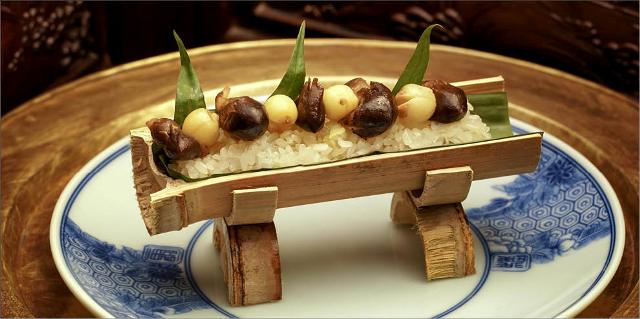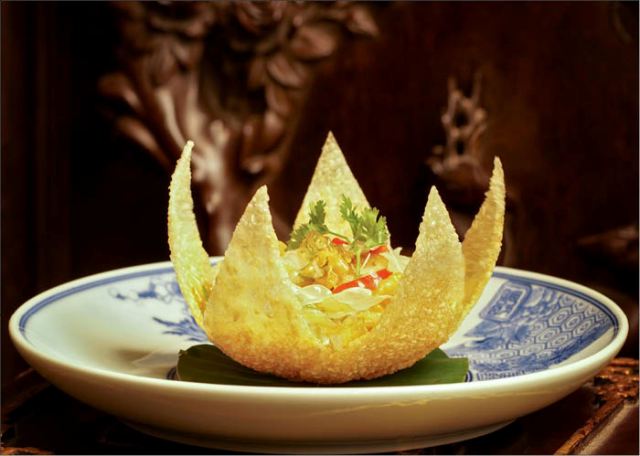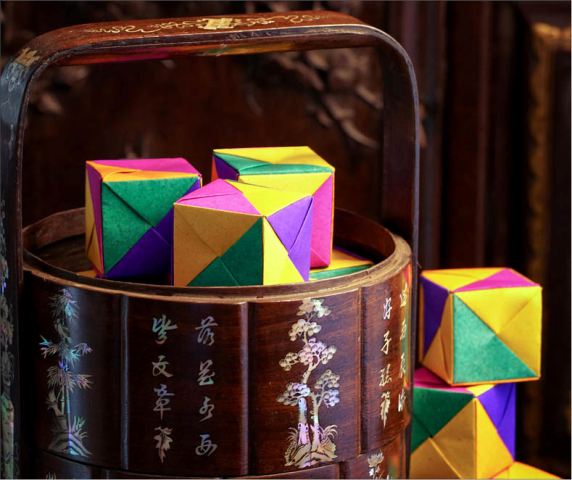On the sidelines of the APEC Women and the Economy 2017 Forum taking place in Hue on September 27, at the Hue Cultural Museum, delegates from 21 APEC economies shared the "Tịnh Yến" - Vegetarian Banquet sponsored by Ho Chi Minh City Development and Peace Fund, with Ms. Ton Nu Thi Ninh, Chairman of the Fund, as the event organizer. "Tịnh Yến" was performed by food artisan Ho Thi Hoang Anh and Duy Tan Hotel staff. On the threshold of "Tịnh Yến", artisan Hoang Anh gave the Thua Thien Hue Weekend an interesting conversation around the vegetarian tradition of Hue.
What can you say about Hue's tradition and art of vegetarian cuisine?
Hue City is an old capital, where Buddhism flourished up to a point of almost becoming a state religion in the feudal period, so the art of vegetarian cuisine in Hue is particularly special. The large pagodas in Hue such as Dieu De, Thien Mu, Giac Hoang ... all have a variety of vegetarian dishes.
In the feudal period, during major festivals such as the Nam Giao sacrificial ritual to pray for a peaceful year, the king and the mandarins must fast for three days prior to cleanse their body. So the royal chefs were responsible for preparing Ngoc soan, Trai soan - the special vegetarian dishes to offer to the king. In addition, at the mandarin courts, vegetarian cooking also developed into a delicate and sophisticated art.
Before, we have introduced the restoration of royal banquets such as: Restoration of the royal feast at Duyet Thi Duong (Royal Theatre) in 2011, the feast at the Hue Festival 2014 and 2016 with savoury dishes which are considered as exotic treats, such as bird's nest, shark's fin, abalone... This time we would like to introduce a unique feature of Hue cuisine which is called Trai soan (in the Hue language it means "Vegetarian") to introduce to the guests at home and abroad when attending the APEC 2017 forum.
Hue vegetarian cuisine is very rich. Today, we choose a few dishes called the treasure of Hue such as thanh trà grapefruit, mối mushrooms (Termitomyces albuminosus), millet seeds ... to serve as an initial introduction to the traditional art of Hue vegetarian cuisine.
Hue City has the advantage of traditional high-quality vegetarian cooking, especially sophisticated, so we can confidently introduce to the international guests a unique cuisine of Hue itself.
With the characteristics of an old capital, where Buddhism was considered as the state religion, Hue's vegetarian dishes, in my opinion, can become a different and unique travel product of Hue.

Glutinous rice with mối mushrooms in bamboo pipes
Can you tell us more about the difference between the traditional vegetarian dishes of the ordinary people and the royal court?
The vegetarian dishes of ordinary people were made from the basic ingredients of vegetables and fruits, depending on the season, which were used arbitrarily. In the palace, vegetarian dishes were also based on the basic materials, but with the ingenuity of the royal chefs, the basic ingredients were combined with high quality and luxurious ingredients. These high quality ingredients were selected based on the season. The finest ingredients were locally produced to offer to the King. Together with their sophisticated techniques, the royal chefs were able to create harmonious dishes in color and taste.

Nguyet Bieu thanh trà grapefruit salad
Which vegetarian dishes were served at the APEC 2017 vegetarian banquet and why did you choose them?
The important event of APEC 2017 in Hue took place in the autumn. So, according to the concept of the season that I chose the ingredients of the season and of Hue itself. The menu included:
Thanh trà grapefruit salad: Thanh trà grapefruit is a fruit of autumn that only Hue has, but the best ones are grown on the mudflats of the Huong River - Nguyet Bieu. Thanh trà has a sweet but sour taste, especially refreshing to be made into an appetizer and the salad is served with Sia sesame ricepaper.
2- Millet seeds cake - vegetarian bologna - Hue fried rolls: Millet is a high-value cereal considered by the ancients to be the most beautiful. The small grains of Hue millet are very fragrant. They are processed through many complicated steps. The filling of the cakes are Măng Ðông bamboo shoots with forest shiitake mushrooms, creating a unique taste. The vegetarian bologna are made from "phù chúc" - a product from soybeans - through special processing techniques, has been turned into a kind of delicious "bologna"; Squared fried rolls are traditional spring rolls of Hue which were regularly present in the food trays of worship and banquets, which has now gradually grow absent. It is very different from the other rolls of the southern or northern provinces. So today I bring this "Hue only" rolls to the banquet. This dish is served with figs and pickled vegetables and fruits which have been carefully trimmed.
3. Hue-style water salad: A colorful picture when presented with more than 20 different vegetables using the same Song than vermicelli - a Binh Dinh specialty but popular in Hue's old imperial palace, offered by the mandarins to the King. These diverse ingredients combined with a cup of herbal juice give a natural sweet taste for a unique flavor.
4 - Glutinous rice with mối mushrooms in bamboo pipes: Mối mushrooms are a mushroom which only grow in the wild, depending on the local soil that appears only for a very short time. These rare and valuable mushrooms, added with its delicious taste, should be listed as "Thời trân" (valuable treasures). If normal people cook this glutinous rice by wrapping it in banana leaves for baking, then in the royal palace, the artisans of the royal kitchen wrapped it in dong leaves and then put it into the bamboo tube and grill on charcoal in the way of the ancient Vietnamese people.

Pháp lam
cakes
5- Colorful pháp lam cakes: This is the type of cakes used in the royal banquet which was completely lost for a long time. Usually during special occasions or offerings on the holidays, on the birthdays of the royal family, especially the birthday of the King, Queen, Queen Mother, etc., the royal kitchen created many types of cakes from different ingredients, such as bình tinh cakes, lotus seeds cakes, and cakes made from different types of beans. They were all packed in brilliant monochrome color wrappers. Depending on the type of cake, only one specific color was used. Only with pháp lam cakes, five color wrapping papers were used with a very elaborate folding technique. The colors of the wrapping papers were primary colors - the main colors used in pháp lam art displayed in the palace. Therefore, the cakes were called pháp lam cakes. The filling is a harmonious combination of glutinous rice flour, bình tinh flour, and watermelon jam. Pháp lam cakes deserve to be the dessert for the banquet full of color and refreshing aroma.
Thank you for this interesting conversation.